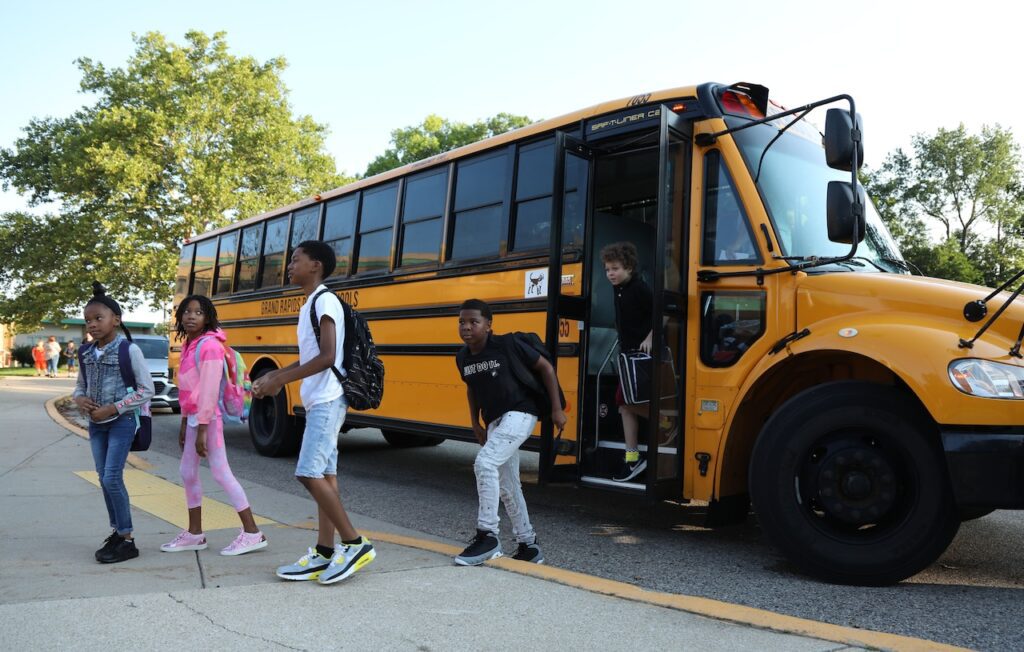K-12 schools would receive nearly 25% more in funding for each student under the education budget proposal put forward by Michigan House Republicans.
However, free student meals and other programs would be cut based on the plan.
House Republicans unveiled their $21.9 billion budget proposal on Wednesday, June 11, that would significantly increase funding to schools by cutting billions in funding earmarked for specific programs or student populations.
The plan advanced along party lines out of the state House Appropriations Committee, with Republicans in favor and Democrats opposed.
The budget is likely to face resistance in the Democratic-controlled Senate, which in April passed its own K-12 budget. The chambers are required to agree on a budget by July 1.
The House Republican plan calls for increasing per pupil funding foundation allowance from the current $9,608 per student to $10,025 per student in the upcoming fiscal year. That’s an increase of about 4.3% and would generate about $558 million more for schools each year.
On top of that funding, House Republicans want to inject nearly $3.08 billion in funds into school districts from sweeping cuts to funds known as “categoricals,” which are dollars earmarked for specific programs or student populations.
This plan would increase per-pupil funding by an estimated $1,975, bringing the total to an estimated $12,000 per pupil – an increase of about 25% from current funding.
The Senate is proposing $10,008 per student in their $21.8 billion budget.
Related: Michigan teachers would see higher pay under Senate Democrats’ $21.8B education budget
To receive this extra per pupil funding under the Republican plan, school districts would have to pledge to fund at least one school police officer and one mental health support staff member.
The Republican plan also targets diversity, equity and inclusion initiatives.
Districts would receive a 20% foundation allowance penalty if they do any of the following: use a curriculum that includes race or gender stereotyping, use state funding for DEI initiative, allow transgender girls to participate in girls’ sports or provide multi-stall, unisex bathrooms.
The categorical cuts include $200 million for the free breakfast and lunches program, $259 million to mental health and school safety resources, $137 million for transportation and other needs faced by rural schools, $62 million for career and technical courses and $125 million for recruitment and retention of teachers, according to the Michigan Education Association (MEA). About $158.9 million would also be cut in literacy support and coaching.
Related: Number of Michigan students getting free school breakfast, lunch skyrockets, state says
House Republicans say shifting dollars from categoricals to per-pupil funding gives school districts greater flexibility. They can still fund these programs with the additional dollars, if they choose and deem it necessary.
State Rep. Tim Kelly, R-Saginaw Township, chairs the House School Aid and Department of Education Committee. He said while K-12 funding has increased, student performance hasn’t.
That’s why it’s time for a “shock to the system,” he said, one that gets back to fundamental spending habits and rids the budget of categorical funding that he says has diverted dollars from the classroom.
“We need a shock to the system that recalibrates the discussion on parity, equitable funding and solidifying that dollars follow the child,” Kelly said. “This small, beautiful bill may be imperfect to some, but it shines the light like a north star where we have others following our lead and trying to increase the per pupil allotment, so I think we’re headed in the right direction.”
But MEA, which represents about 120,000 teachers and other education professionals in the state, says the budget isn’t good for students, staff and families.
“The House’s budget would harm students’ opportunities to get the education and skills they need to land good-paying careers after graduation,” said MEA spokesperson Thomas Morgan. “It would gut services that students and families rely on, including career and technical education, school meals, rural transportation, student mental health services, school safety and other essential programs.
“These cuts to our local schools would make it impossible for Michigan to ensure that every student — no matter where they live — has access to a quality public education that can prepare them for the future.”
State Rep. Carol Glanville, D-Walker, said the funding shift would hurt school districts that have more needs than others.
By giving all districts the same amount of money, some of those districts will have more dollars in the classroom while others will have to divert those dollars to things that are now not directly funded by the state.
As an example, Glanville pointed to Republicans proposing to cut the total $8 million in ongoing funding for the Flint School District that funds nutrition programs, school nurses, social workers, interventions and other support staff in the aftermath of the Flint water crisis.
“They have additional costs and yet this district is not receiving money for those costs,” she said. “They’re getting the same sort of amount that any other district would get and they’re expected then to take that money and choose whether or not to spend it on those additional costs that they have, so I’m not sure how that is parity.”
House Republicans on Wednesday also unveiled and advanced their spending plan for higher education.
Related: University of Michigan, MSU face huge funding cuts under House Republican budget

